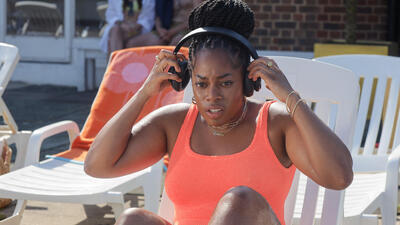But first though, “Queenie” gives us her descent to rock bottom. This show starts out bleak and gets worse as Queenie spirals. There’s humor, yes, but she’s dealing with a host of serious stuff—a history of abandonment, domestic violence, and betrayal—all of which are brought to the forefront thanks to a breakup and her estranged mother’s attempts to reconcile. It’s hard to watch.

To deal, she drinks too much. She has rough sex with strangers. She lets her work slide, endangering her budding career as a journalist. She’s just twenty-five, and lots of her decisions could be chalked up to the normal pitfalls of youthful exploration. But “Queenie” is clear that something else is happening in its realistic South London setting.
Our heroine—and it’s impossible not to root for her even as she makes repeated mistakes—is confronting an institutional set of challenges with an incomplete toolbox. She faces racism at work and in the dating pool. Sexism abounds wherever she goes, including her own mind.

On her side, she has a rich cultural tradition to draw from in her Jamaican heritage. Her mother excluded, she has strong relationships with her multigenerational family who want the best for her and are ready to help—even if their ideas about what “the best” is and how to get there aren’t always compatible with hers.
What she doesn’t have is good models for dealing with the hard shit that’s bubbling up in her psyche—she only knows how to push emotions down for everyone else’s benefit, rather than figuring out how to ask for help or process what she’s feeling for herself.
After five episodes of acting out and facing an unforgiving world, Queenie hits rock bottom. For viewers who make it this far, the rewards are rich. Over the remaining three episodes, Queenie transforms, slowly and laboriously but successfully. And here’s where the show shines, demonstrating what therapy can actually accomplish and how it works.

